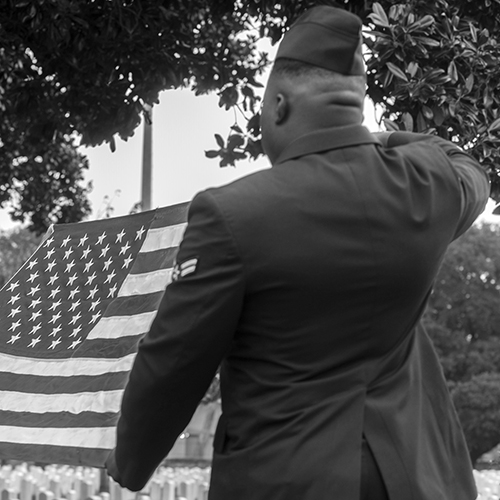Story of Justice: Mike the Vet and a case for PTSD
 Background: While in the Army in the 1980s, Mike, an African American, was stationed in rural Germany transporting and guarding nuclear weapons to and from small German towns. The locals did not agree with the US occupying and storing nukes in their villages, so they protested the military presence. One day while returning to base, Mike was trapped in his Jeep by a crowd of protesters outside of the base. The Army refused to allow the vehicle access in fear that the protest would spill into the military installment. Mike recalls the German protesters shaking the Jeep, hurling projectiles, and shouting racial slurs at him for over an hour. Mike also recognized that many of the protesters were Germans who worked with his unit on the base. At the time Mike believed that he was going to die and actually loaded his service weapon in anticipation of a breach into his vehicle. Fortunately, the crowd eventually disbursed, but from that day forward he would hide extra ammunition in his clothes “just in case [he] needed a way out”.
Background: While in the Army in the 1980s, Mike, an African American, was stationed in rural Germany transporting and guarding nuclear weapons to and from small German towns. The locals did not agree with the US occupying and storing nukes in their villages, so they protested the military presence. One day while returning to base, Mike was trapped in his Jeep by a crowd of protesters outside of the base. The Army refused to allow the vehicle access in fear that the protest would spill into the military installment. Mike recalls the German protesters shaking the Jeep, hurling projectiles, and shouting racial slurs at him for over an hour. Mike also recognized that many of the protesters were Germans who worked with his unit on the base. At the time Mike believed that he was going to die and actually loaded his service weapon in anticipation of a breach into his vehicle. Fortunately, the crowd eventually disbursed, but from that day forward he would hide extra ammunition in his clothes “just in case [he] needed a way out”.
The Challenge: It was not until the early 2000s when Mike started to experience more severe symptoms of post-traumatic stress disorder (PTSD). He developed severe agoraphobia, became aggressive, and suicidal – symptoms that lead to hospitalizations in 2007 and 2008. In 2007, while hospitalized, Mike filed a claim for service connected disability compensation with the Department of Veterans Affairs, which was initially denied as the VA found that Mike’s story was not supported by evidence. Essentially, the VA claimed that they could not find any records of protests, riots, or violence in Germany during that time. In 2009, Mike reapplied for benefits, was initially denied for procedural reasons, and went through the lengthy appeals process. In 2015, Mike was able to attended a Board of Veterans Appeals hearing and had the opportunity to tell his story in person. The Board remanded his case back to VA for further development. In 2017, after about two years the case was formally denied because the VA could not locate records of the protests through the JSRRC (the records liaison between the VA and the military branches). In 2018, the Board again remanded the case to VA with instructions to provide Mike with a medical examination (called a compensation & pension exam or C&P) to determine the source of his PTSD.
Assistance: Around this time, the VA was testing out a new appeals system called the rapid appeals modernization program (RAMP), which a Veteran could opt into for faster processing of their appeal in exchange for dismissing their “legacy” appeal. By all accounts RAMP was a huge failure. Without understanding the repercussions of his actions, Mike decided to opt into RAMP and his case was promptly denied without a C&P exam. This is when Mike reached out to Legal Aid. We used Mike’s RAMP election to bypass the lower VA administrative process and sent the case back to the Board for review with a detailed brief outlining what had happened. As expected, it took the Board about 12 months to render a decision on this case. In this case, the Board provided a full grant of the Veteran’s PTSD claim. We also received a great 5-page decision outlining the VA’s inefficiencies (e.g. in 2016 a VA doctor concluded that Mike’s PTSD was likely related to the in-service stressor; his military records actually contained evidence of the protests; and the VA was wrong with equating a negative response for records as evidence that the event did not occur).
Why it Matters: We called Mike to confirm that he received his retroactive pay from the VA in the amount of $60,000. He was very grateful and thanked me for helping him when no one else understood what was going on. Mike said that the money could not have come at a better time as he was just recently hospitalized and he was struggling to pay his bills.![]()
*Names and images have been changed to protect the privacy of our clients
Donate Today!
